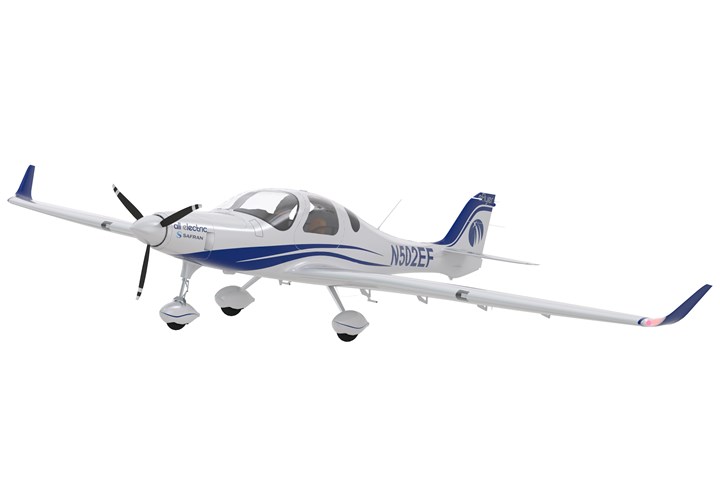Bye Aerospace begins production for eFlyer-2 all-composite fuselage
Composites Universal Group has been contracted to create the carbon fiber fuselage, advancing the all-electric eFlyer-2 toward FAA certification.

Artist rendering of the eFlyer-2. Photo Credit: Bye Aerospace
Bye Aerospace (Denver, Colo., U.S.) announced on Jan. 26 that production has commenced on Serial #001, its first production-conforming prototype for its two-seat all-electric eFlyer 2, with the company also in the process of obtaining FAA Part-23 certification for the rebranded aircraft for the professional flight training mission.
George E. Bye, CEO of Bye Aerospace, says the company has contracted with Composites Universal Group (CUG, St. Helens, Ore., U.S.) to begin assembly of the eFlyer 2’s first major component, an all-carbon fiber fuselage.
“We continue to make advances in the certification process,” Bye says. “These activities commence production of the first conforming eFlyer 2, the first of three planned conforming eFlyer 2 aircraft that will be used to help complete final FAA certification. We look forward to working with Steve Ruege and the team at CUG.”
“Composites Universal Group is extremely proud to have been selected by George and the team at Bye Aerospace to begin tooling and construction for the all-carbon fiber fuselage for Serial #001 of the eFlyer 2 aircraft,” says Steve Ruege, CEO of CUG. “We all feel here at CUG that Bye Aerospace has hit a home run with this next-generation all-electric aircraft design. We are excited about working collaboratively with the Bye Aerospace team to achieve FAA certification and commencing production.”
Bye Aerospace’s current and future families of aircraft feature engineering, research and electric aircraft solutions designed to specifically address compelling market needs. Benefits include five-fold lower operating costs, no CO2 emissions and decreased noise. The company estimates the eFlyer will eventually eliminate the release of millions of metric tons of CO2 each year as its deliveries begin and the general aviation fleet is replaced.
Related Content
-
Bio-based acrylonitrile for carbon fiber manufacture
The quest for a sustainable source of acrylonitrile for carbon fiber manufacture has made the leap from the lab to the market.
-
PEEK vs. PEKK vs. PAEK and continuous compression molding
Suppliers of thermoplastics and carbon fiber chime in regarding PEEK vs. PEKK, and now PAEK, as well as in-situ consolidation — the supply chain for thermoplastic tape composites continues to evolve.
-
The lessons behind OceanGate
Carbon fiber composites faced much criticism in the wake of the OceanGate submersible accident. CW’s publisher Jeff Sloan explains that it’s not that simple.
















